Comparative Analysis: Business Ethics and Social Responsibility
VerifiedAdded on 2020/05/16
|8
|1857
|53
Essay
AI Summary
This essay delves into the core concepts of business ethics and social responsibility, drawing upon insights from various sources including YouTube videos and academic research. The analysis begins with an examination of moral agency and the subject of moral worth, emphasizing the importance of treating others with respect and understanding the impact of individual actions. The essay then explores incrementalism, highlighting how unethical behaviors can develop gradually. Further, it discusses the fundamental moral unit, arguing that ethical decisions should consider the broader impact on the community. The essay also addresses ethical fading, explaining how individuals sometimes make decisions without fully considering the ethical dimensions. Finally, the essay examines conflicts of interest, illustrating how personal gains can sometimes overshadow the interests of others and the importance of honesty and integrity in making ethical choices. The work references multiple YouTube videos and scholarly articles to support its arguments, providing a comprehensive overview of the key concepts.
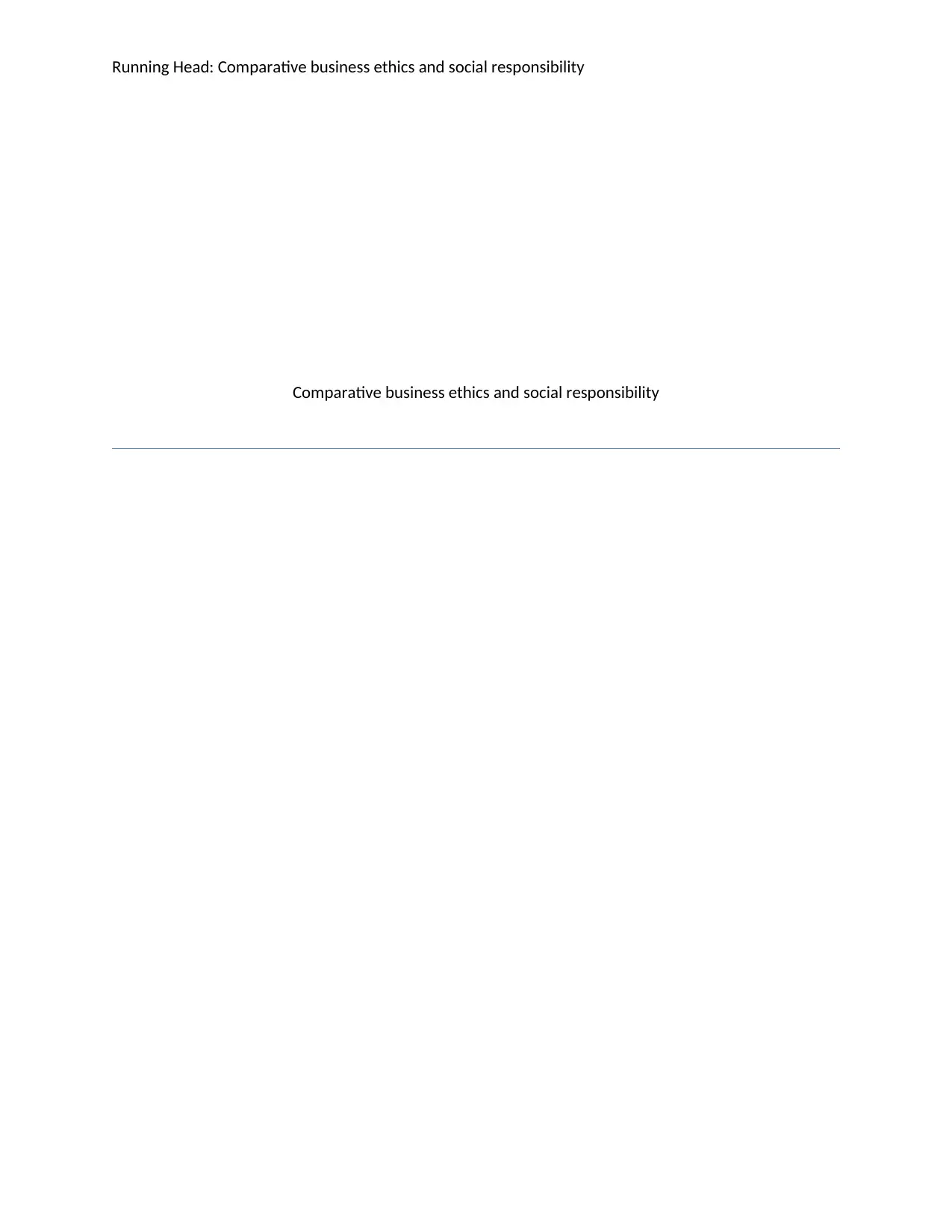
Running Head: Comparative business ethics and social responsibility
Comparative business ethics and social responsibility
Comparative business ethics and social responsibility
Paraphrase This Document
Need a fresh take? Get an instant paraphrase of this document with our AI Paraphraser
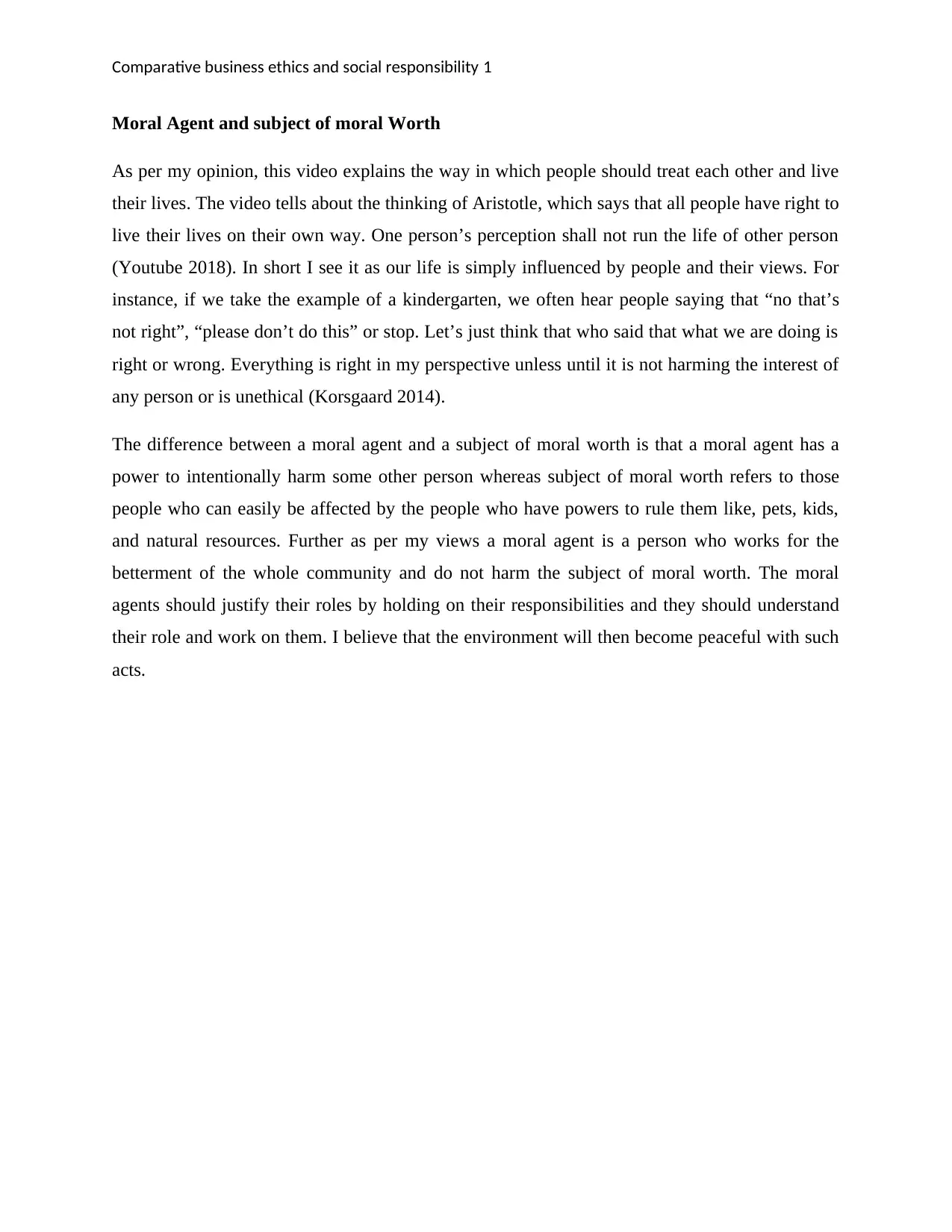
Comparative business ethics and social responsibility 1
Moral Agent and subject of moral Worth
As per my opinion, this video explains the way in which people should treat each other and live
their lives. The video tells about the thinking of Aristotle, which says that all people have right to
live their lives on their own way. One person’s perception shall not run the life of other person
(Youtube 2018). In short I see it as our life is simply influenced by people and their views. For
instance, if we take the example of a kindergarten, we often hear people saying that “no that’s
not right”, “please don’t do this” or stop. Let’s just think that who said that what we are doing is
right or wrong. Everything is right in my perspective unless until it is not harming the interest of
any person or is unethical (Korsgaard 2014).
The difference between a moral agent and a subject of moral worth is that a moral agent has a
power to intentionally harm some other person whereas subject of moral worth refers to those
people who can easily be affected by the people who have powers to rule them like, pets, kids,
and natural resources. Further as per my views a moral agent is a person who works for the
betterment of the whole community and do not harm the subject of moral worth. The moral
agents should justify their roles by holding on their responsibilities and they should understand
their role and work on them. I believe that the environment will then become peaceful with such
acts.
Moral Agent and subject of moral Worth
As per my opinion, this video explains the way in which people should treat each other and live
their lives. The video tells about the thinking of Aristotle, which says that all people have right to
live their lives on their own way. One person’s perception shall not run the life of other person
(Youtube 2018). In short I see it as our life is simply influenced by people and their views. For
instance, if we take the example of a kindergarten, we often hear people saying that “no that’s
not right”, “please don’t do this” or stop. Let’s just think that who said that what we are doing is
right or wrong. Everything is right in my perspective unless until it is not harming the interest of
any person or is unethical (Korsgaard 2014).
The difference between a moral agent and a subject of moral worth is that a moral agent has a
power to intentionally harm some other person whereas subject of moral worth refers to those
people who can easily be affected by the people who have powers to rule them like, pets, kids,
and natural resources. Further as per my views a moral agent is a person who works for the
betterment of the whole community and do not harm the subject of moral worth. The moral
agents should justify their roles by holding on their responsibilities and they should understand
their role and work on them. I believe that the environment will then become peaceful with such
acts.
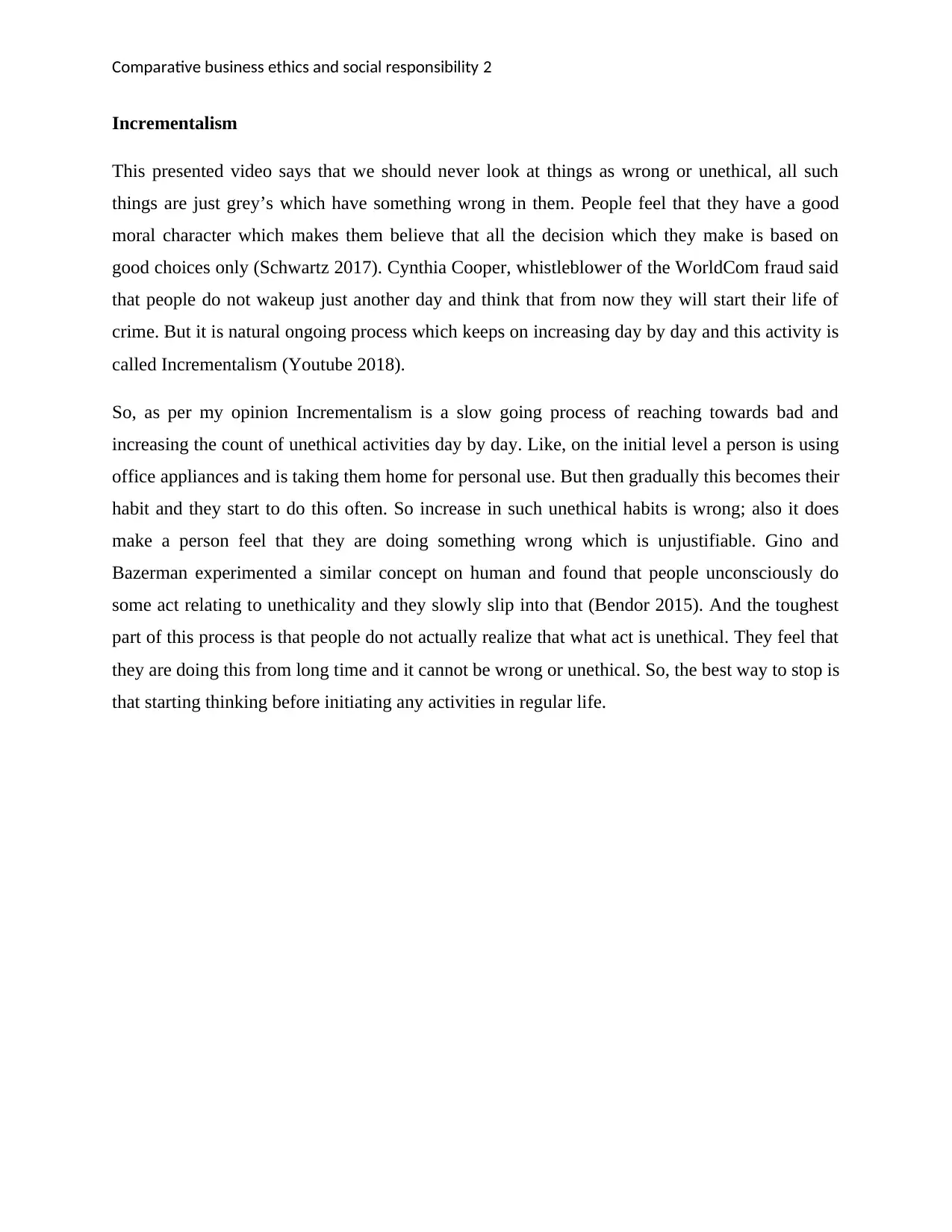
Comparative business ethics and social responsibility 2
Incrementalism
This presented video says that we should never look at things as wrong or unethical, all such
things are just grey’s which have something wrong in them. People feel that they have a good
moral character which makes them believe that all the decision which they make is based on
good choices only (Schwartz 2017). Cynthia Cooper, whistleblower of the WorldCom fraud said
that people do not wakeup just another day and think that from now they will start their life of
crime. But it is natural ongoing process which keeps on increasing day by day and this activity is
called Incrementalism (Youtube 2018).
So, as per my opinion Incrementalism is a slow going process of reaching towards bad and
increasing the count of unethical activities day by day. Like, on the initial level a person is using
office appliances and is taking them home for personal use. But then gradually this becomes their
habit and they start to do this often. So increase in such unethical habits is wrong; also it does
make a person feel that they are doing something wrong which is unjustifiable. Gino and
Bazerman experimented a similar concept on human and found that people unconsciously do
some act relating to unethicality and they slowly slip into that (Bendor 2015). And the toughest
part of this process is that people do not actually realize that what act is unethical. They feel that
they are doing this from long time and it cannot be wrong or unethical. So, the best way to stop is
that starting thinking before initiating any activities in regular life.
Incrementalism
This presented video says that we should never look at things as wrong or unethical, all such
things are just grey’s which have something wrong in them. People feel that they have a good
moral character which makes them believe that all the decision which they make is based on
good choices only (Schwartz 2017). Cynthia Cooper, whistleblower of the WorldCom fraud said
that people do not wakeup just another day and think that from now they will start their life of
crime. But it is natural ongoing process which keeps on increasing day by day and this activity is
called Incrementalism (Youtube 2018).
So, as per my opinion Incrementalism is a slow going process of reaching towards bad and
increasing the count of unethical activities day by day. Like, on the initial level a person is using
office appliances and is taking them home for personal use. But then gradually this becomes their
habit and they start to do this often. So increase in such unethical habits is wrong; also it does
make a person feel that they are doing something wrong which is unjustifiable. Gino and
Bazerman experimented a similar concept on human and found that people unconsciously do
some act relating to unethicality and they slowly slip into that (Bendor 2015). And the toughest
part of this process is that people do not actually realize that what act is unethical. They feel that
they are doing this from long time and it cannot be wrong or unethical. So, the best way to stop is
that starting thinking before initiating any activities in regular life.
⊘ This is a preview!⊘
Do you want full access?
Subscribe today to unlock all pages.

Trusted by 1+ million students worldwide
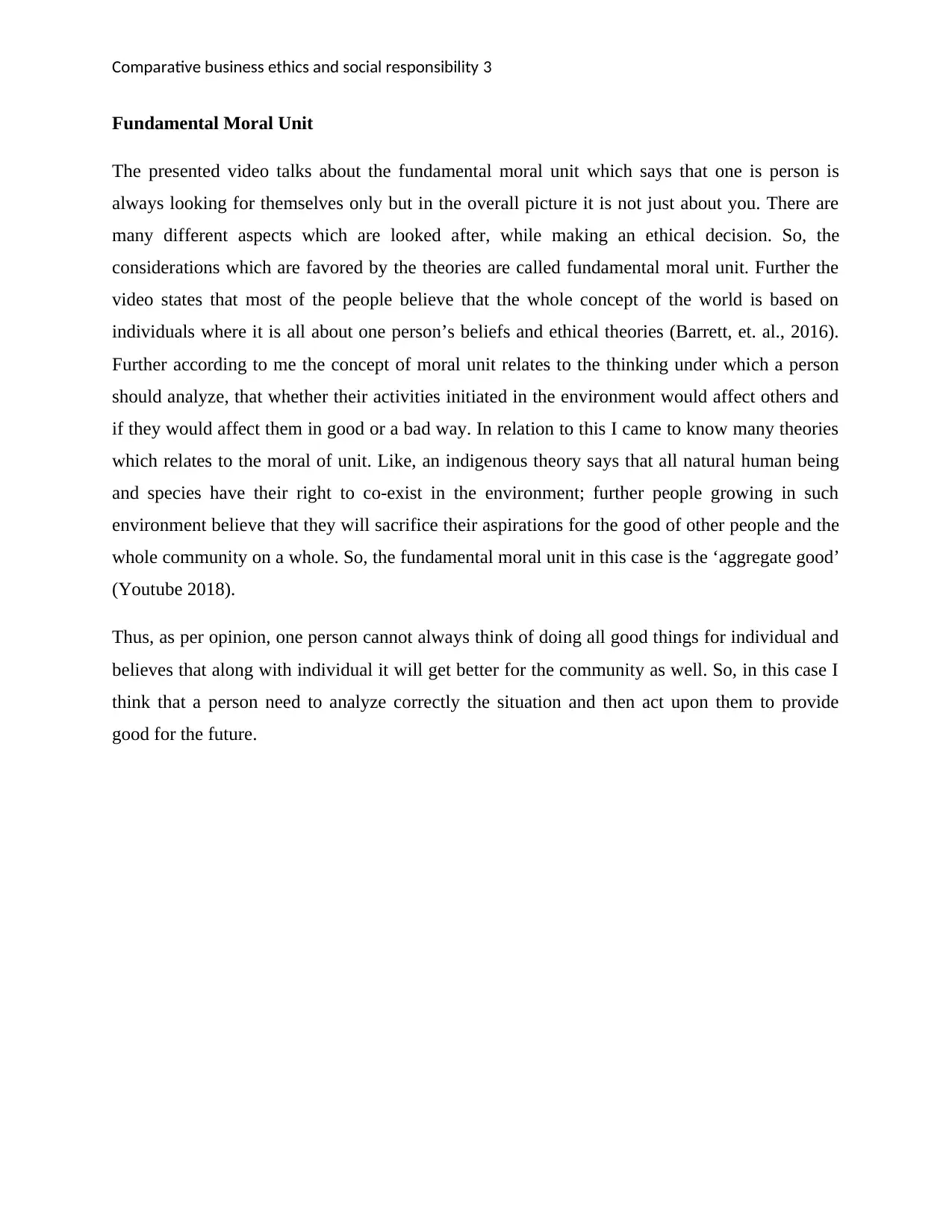
Comparative business ethics and social responsibility 3
Fundamental Moral Unit
The presented video talks about the fundamental moral unit which says that one is person is
always looking for themselves only but in the overall picture it is not just about you. There are
many different aspects which are looked after, while making an ethical decision. So, the
considerations which are favored by the theories are called fundamental moral unit. Further the
video states that most of the people believe that the whole concept of the world is based on
individuals where it is all about one person’s beliefs and ethical theories (Barrett, et. al., 2016).
Further according to me the concept of moral unit relates to the thinking under which a person
should analyze, that whether their activities initiated in the environment would affect others and
if they would affect them in good or a bad way. In relation to this I came to know many theories
which relates to the moral of unit. Like, an indigenous theory says that all natural human being
and species have their right to co-exist in the environment; further people growing in such
environment believe that they will sacrifice their aspirations for the good of other people and the
whole community on a whole. So, the fundamental moral unit in this case is the ‘aggregate good’
(Youtube 2018).
Thus, as per opinion, one person cannot always think of doing all good things for individual and
believes that along with individual it will get better for the community as well. So, in this case I
think that a person need to analyze correctly the situation and then act upon them to provide
good for the future.
Fundamental Moral Unit
The presented video talks about the fundamental moral unit which says that one is person is
always looking for themselves only but in the overall picture it is not just about you. There are
many different aspects which are looked after, while making an ethical decision. So, the
considerations which are favored by the theories are called fundamental moral unit. Further the
video states that most of the people believe that the whole concept of the world is based on
individuals where it is all about one person’s beliefs and ethical theories (Barrett, et. al., 2016).
Further according to me the concept of moral unit relates to the thinking under which a person
should analyze, that whether their activities initiated in the environment would affect others and
if they would affect them in good or a bad way. In relation to this I came to know many theories
which relates to the moral of unit. Like, an indigenous theory says that all natural human being
and species have their right to co-exist in the environment; further people growing in such
environment believe that they will sacrifice their aspirations for the good of other people and the
whole community on a whole. So, the fundamental moral unit in this case is the ‘aggregate good’
(Youtube 2018).
Thus, as per opinion, one person cannot always think of doing all good things for individual and
believes that along with individual it will get better for the community as well. So, in this case I
think that a person need to analyze correctly the situation and then act upon them to provide
good for the future.
Paraphrase This Document
Need a fresh take? Get an instant paraphrase of this document with our AI Paraphraser
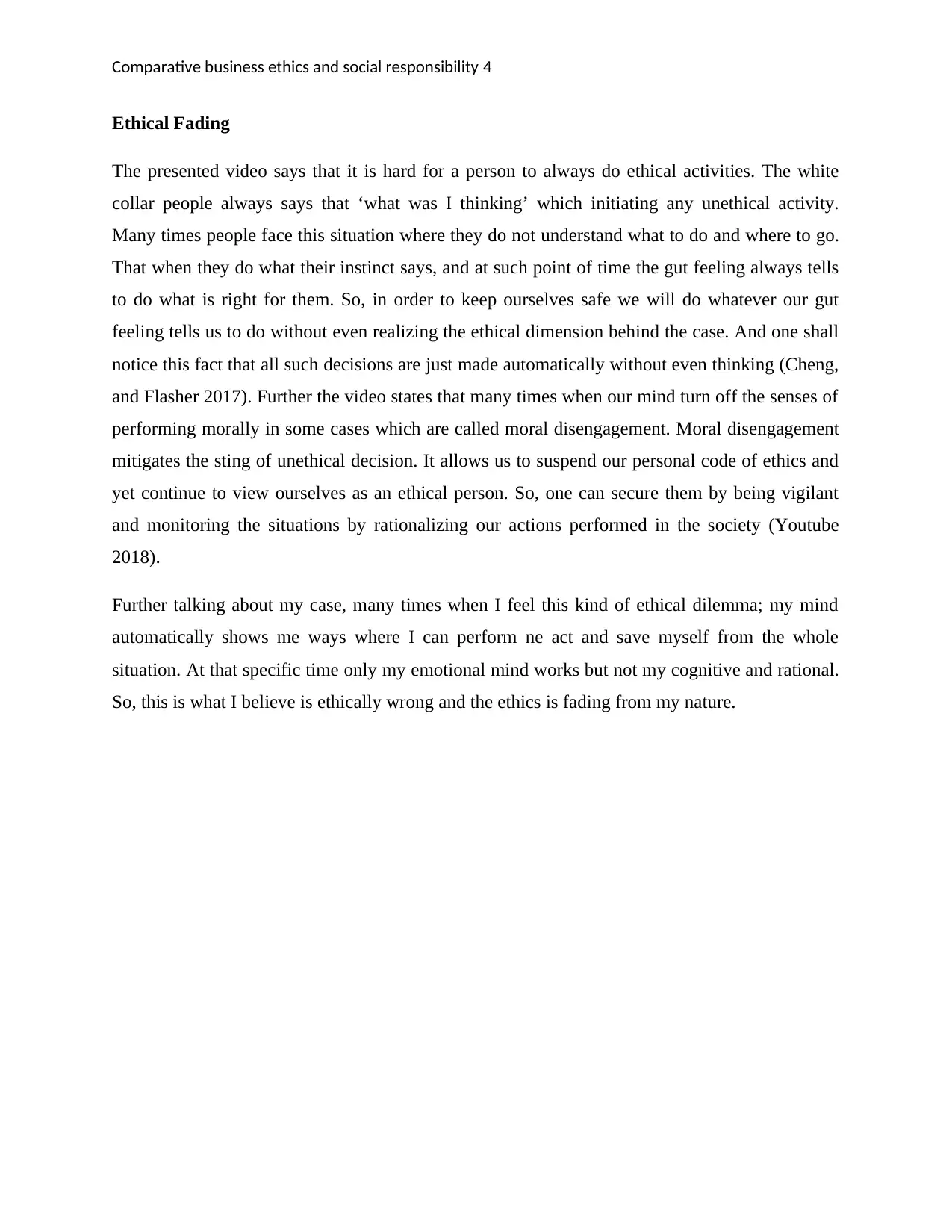
Comparative business ethics and social responsibility 4
Ethical Fading
The presented video says that it is hard for a person to always do ethical activities. The white
collar people always says that ‘what was I thinking’ which initiating any unethical activity.
Many times people face this situation where they do not understand what to do and where to go.
That when they do what their instinct says, and at such point of time the gut feeling always tells
to do what is right for them. So, in order to keep ourselves safe we will do whatever our gut
feeling tells us to do without even realizing the ethical dimension behind the case. And one shall
notice this fact that all such decisions are just made automatically without even thinking (Cheng,
and Flasher 2017). Further the video states that many times when our mind turn off the senses of
performing morally in some cases which are called moral disengagement. Moral disengagement
mitigates the sting of unethical decision. It allows us to suspend our personal code of ethics and
yet continue to view ourselves as an ethical person. So, one can secure them by being vigilant
and monitoring the situations by rationalizing our actions performed in the society (Youtube
2018).
Further talking about my case, many times when I feel this kind of ethical dilemma; my mind
automatically shows me ways where I can perform ne act and save myself from the whole
situation. At that specific time only my emotional mind works but not my cognitive and rational.
So, this is what I believe is ethically wrong and the ethics is fading from my nature.
Ethical Fading
The presented video says that it is hard for a person to always do ethical activities. The white
collar people always says that ‘what was I thinking’ which initiating any unethical activity.
Many times people face this situation where they do not understand what to do and where to go.
That when they do what their instinct says, and at such point of time the gut feeling always tells
to do what is right for them. So, in order to keep ourselves safe we will do whatever our gut
feeling tells us to do without even realizing the ethical dimension behind the case. And one shall
notice this fact that all such decisions are just made automatically without even thinking (Cheng,
and Flasher 2017). Further the video states that many times when our mind turn off the senses of
performing morally in some cases which are called moral disengagement. Moral disengagement
mitigates the sting of unethical decision. It allows us to suspend our personal code of ethics and
yet continue to view ourselves as an ethical person. So, one can secure them by being vigilant
and monitoring the situations by rationalizing our actions performed in the society (Youtube
2018).
Further talking about my case, many times when I feel this kind of ethical dilemma; my mind
automatically shows me ways where I can perform ne act and save myself from the whole
situation. At that specific time only my emotional mind works but not my cognitive and rational.
So, this is what I believe is ethically wrong and the ethics is fading from my nature.
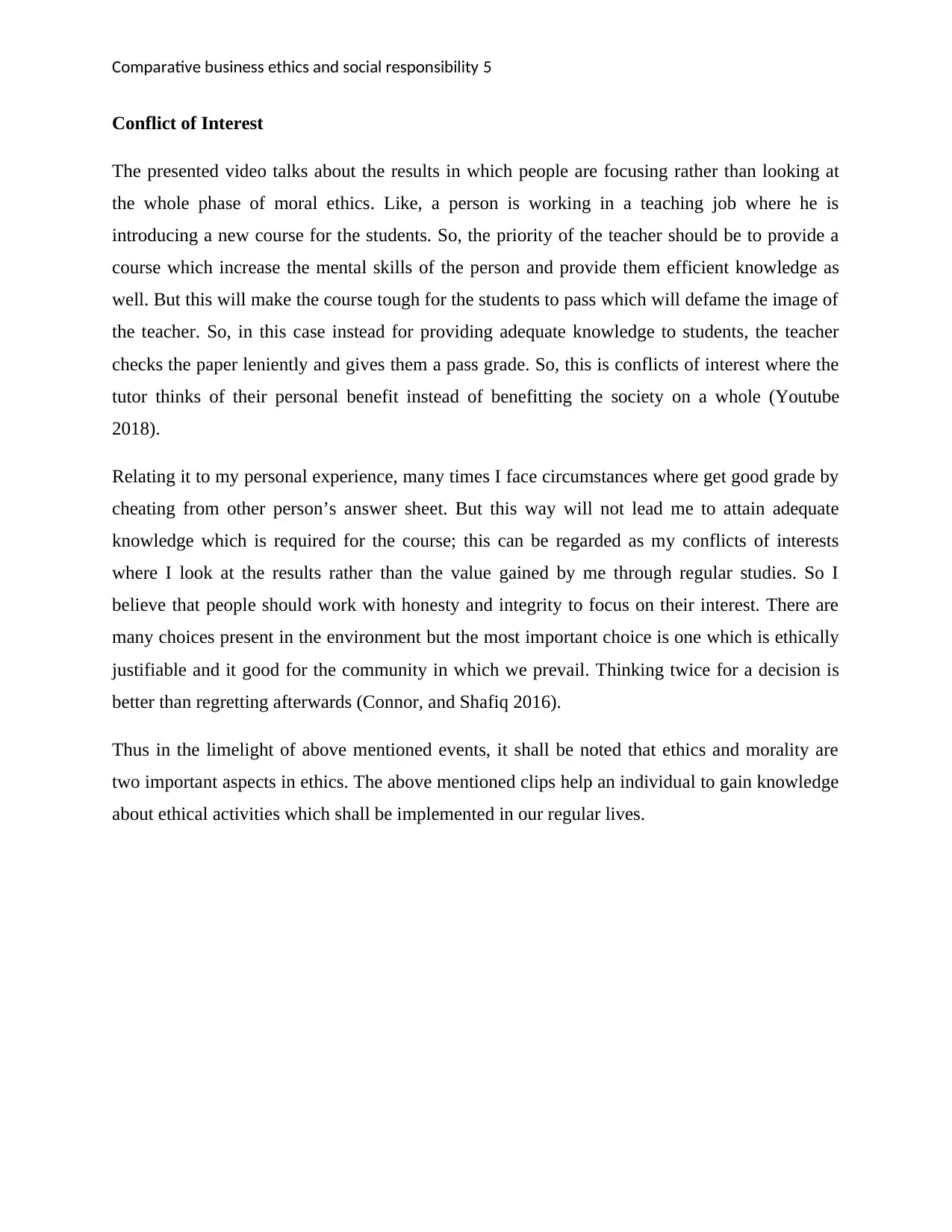
Comparative business ethics and social responsibility 5
Conflict of Interest
The presented video talks about the results in which people are focusing rather than looking at
the whole phase of moral ethics. Like, a person is working in a teaching job where he is
introducing a new course for the students. So, the priority of the teacher should be to provide a
course which increase the mental skills of the person and provide them efficient knowledge as
well. But this will make the course tough for the students to pass which will defame the image of
the teacher. So, in this case instead for providing adequate knowledge to students, the teacher
checks the paper leniently and gives them a pass grade. So, this is conflicts of interest where the
tutor thinks of their personal benefit instead of benefitting the society on a whole (Youtube
2018).
Relating it to my personal experience, many times I face circumstances where get good grade by
cheating from other person’s answer sheet. But this way will not lead me to attain adequate
knowledge which is required for the course; this can be regarded as my conflicts of interests
where I look at the results rather than the value gained by me through regular studies. So I
believe that people should work with honesty and integrity to focus on their interest. There are
many choices present in the environment but the most important choice is one which is ethically
justifiable and it good for the community in which we prevail. Thinking twice for a decision is
better than regretting afterwards (Connor, and Shafiq 2016).
Thus in the limelight of above mentioned events, it shall be noted that ethics and morality are
two important aspects in ethics. The above mentioned clips help an individual to gain knowledge
about ethical activities which shall be implemented in our regular lives.
Conflict of Interest
The presented video talks about the results in which people are focusing rather than looking at
the whole phase of moral ethics. Like, a person is working in a teaching job where he is
introducing a new course for the students. So, the priority of the teacher should be to provide a
course which increase the mental skills of the person and provide them efficient knowledge as
well. But this will make the course tough for the students to pass which will defame the image of
the teacher. So, in this case instead for providing adequate knowledge to students, the teacher
checks the paper leniently and gives them a pass grade. So, this is conflicts of interest where the
tutor thinks of their personal benefit instead of benefitting the society on a whole (Youtube
2018).
Relating it to my personal experience, many times I face circumstances where get good grade by
cheating from other person’s answer sheet. But this way will not lead me to attain adequate
knowledge which is required for the course; this can be regarded as my conflicts of interests
where I look at the results rather than the value gained by me through regular studies. So I
believe that people should work with honesty and integrity to focus on their interest. There are
many choices present in the environment but the most important choice is one which is ethically
justifiable and it good for the community in which we prevail. Thinking twice for a decision is
better than regretting afterwards (Connor, and Shafiq 2016).
Thus in the limelight of above mentioned events, it shall be noted that ethics and morality are
two important aspects in ethics. The above mentioned clips help an individual to gain knowledge
about ethical activities which shall be implemented in our regular lives.
⊘ This is a preview!⊘
Do you want full access?
Subscribe today to unlock all pages.

Trusted by 1+ million students worldwide
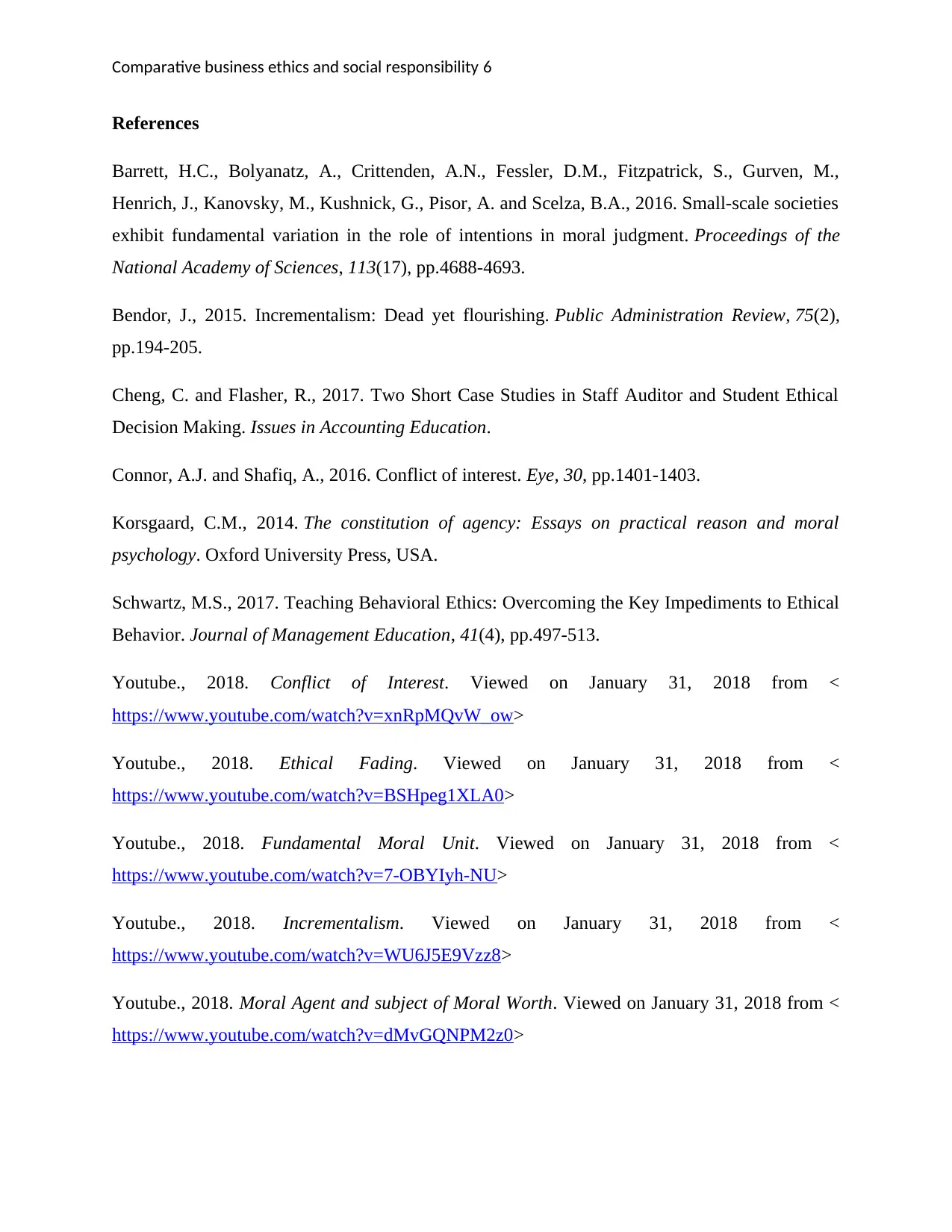
Comparative business ethics and social responsibility 6
References
Barrett, H.C., Bolyanatz, A., Crittenden, A.N., Fessler, D.M., Fitzpatrick, S., Gurven, M.,
Henrich, J., Kanovsky, M., Kushnick, G., Pisor, A. and Scelza, B.A., 2016. Small-scale societies
exhibit fundamental variation in the role of intentions in moral judgment. Proceedings of the
National Academy of Sciences, 113(17), pp.4688-4693.
Bendor, J., 2015. Incrementalism: Dead yet flourishing. Public Administration Review, 75(2),
pp.194-205.
Cheng, C. and Flasher, R., 2017. Two Short Case Studies in Staff Auditor and Student Ethical
Decision Making. Issues in Accounting Education.
Connor, A.J. and Shafiq, A., 2016. Conflict of interest. Eye, 30, pp.1401-1403.
Korsgaard, C.M., 2014. The constitution of agency: Essays on practical reason and moral
psychology. Oxford University Press, USA.
Schwartz, M.S., 2017. Teaching Behavioral Ethics: Overcoming the Key Impediments to Ethical
Behavior. Journal of Management Education, 41(4), pp.497-513.
Youtube., 2018. Conflict of Interest. Viewed on January 31, 2018 from <
https://www.youtube.com/watch?v=xnRpMQvW_ow>
Youtube., 2018. Ethical Fading. Viewed on January 31, 2018 from <
https://www.youtube.com/watch?v=BSHpeg1XLA0>
Youtube., 2018. Fundamental Moral Unit. Viewed on January 31, 2018 from <
https://www.youtube.com/watch?v=7-OBYIyh-NU>
Youtube., 2018. Incrementalism. Viewed on January 31, 2018 from <
https://www.youtube.com/watch?v=WU6J5E9Vzz8>
Youtube., 2018. Moral Agent and subject of Moral Worth. Viewed on January 31, 2018 from <
https://www.youtube.com/watch?v=dMvGQNPM2z0>
References
Barrett, H.C., Bolyanatz, A., Crittenden, A.N., Fessler, D.M., Fitzpatrick, S., Gurven, M.,
Henrich, J., Kanovsky, M., Kushnick, G., Pisor, A. and Scelza, B.A., 2016. Small-scale societies
exhibit fundamental variation in the role of intentions in moral judgment. Proceedings of the
National Academy of Sciences, 113(17), pp.4688-4693.
Bendor, J., 2015. Incrementalism: Dead yet flourishing. Public Administration Review, 75(2),
pp.194-205.
Cheng, C. and Flasher, R., 2017. Two Short Case Studies in Staff Auditor and Student Ethical
Decision Making. Issues in Accounting Education.
Connor, A.J. and Shafiq, A., 2016. Conflict of interest. Eye, 30, pp.1401-1403.
Korsgaard, C.M., 2014. The constitution of agency: Essays on practical reason and moral
psychology. Oxford University Press, USA.
Schwartz, M.S., 2017. Teaching Behavioral Ethics: Overcoming the Key Impediments to Ethical
Behavior. Journal of Management Education, 41(4), pp.497-513.
Youtube., 2018. Conflict of Interest. Viewed on January 31, 2018 from <
https://www.youtube.com/watch?v=xnRpMQvW_ow>
Youtube., 2018. Ethical Fading. Viewed on January 31, 2018 from <
https://www.youtube.com/watch?v=BSHpeg1XLA0>
Youtube., 2018. Fundamental Moral Unit. Viewed on January 31, 2018 from <
https://www.youtube.com/watch?v=7-OBYIyh-NU>
Youtube., 2018. Incrementalism. Viewed on January 31, 2018 from <
https://www.youtube.com/watch?v=WU6J5E9Vzz8>
Youtube., 2018. Moral Agent and subject of Moral Worth. Viewed on January 31, 2018 from <
https://www.youtube.com/watch?v=dMvGQNPM2z0>
Paraphrase This Document
Need a fresh take? Get an instant paraphrase of this document with our AI Paraphraser
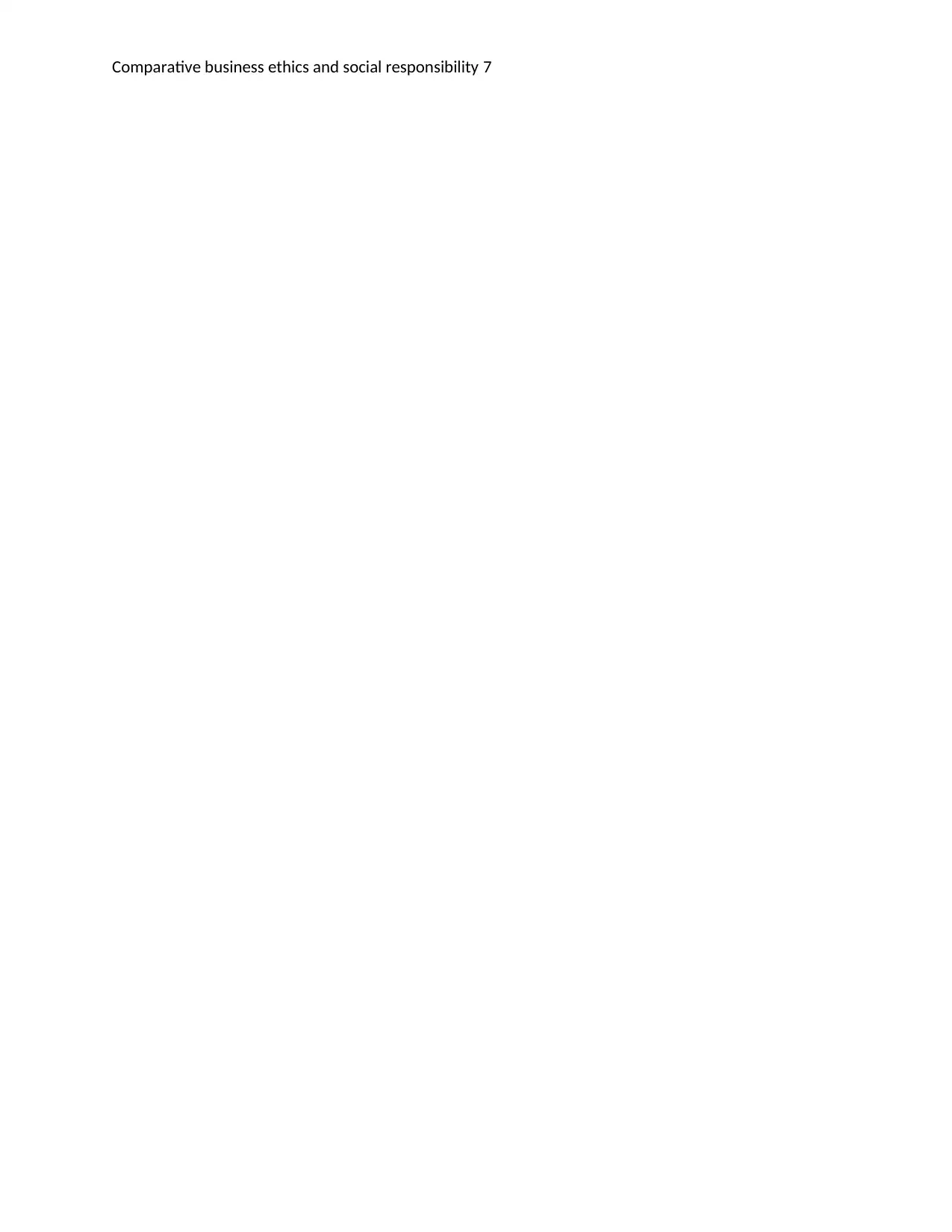
Comparative business ethics and social responsibility 7
1 out of 8
Related Documents
Your All-in-One AI-Powered Toolkit for Academic Success.
+13062052269
info@desklib.com
Available 24*7 on WhatsApp / Email
![[object Object]](/_next/static/media/star-bottom.7253800d.svg)
Unlock your academic potential
Copyright © 2020–2025 A2Z Services. All Rights Reserved. Developed and managed by ZUCOL.





